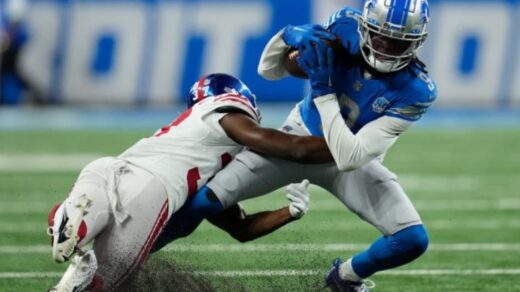Have you ever wondered when NFL players stop playing football? It’s actually a really interesting topic because NFL retirement age is very different from regular jobs!
Most people work until they’re 60 or 65 years old before retiring. But NFL players? They often retire before they even turn 30. Crazy, right?
While most people retire in their 60s, NFL players often retire before they even reach 30.
This happens because football is extremely tough on the body. Every tackle, every hit, and every game takes a toll.
Plus, there’s always younger, faster talent waiting to take their spot on the team.
NFL Retirement Age

To help you understand everything about when and why NFL players retire, the team at FieldBulls.com researched retirement patterns, pension systems, and real player stories.
This guide explains it all in the simplest way possible!
What Is the Average NFL Retirement Age?
The average NFL retirement age is around 27 years old. Yes, you read that right — 27! That’s younger than when most people are just starting their careers.
Why do NFL players retire so young? Here are the main reasons:
| Factor | Explanation |
|---|---|
| Physical strain | Football is a contact sport that wears the body down incredibly fast |
| Short contracts | Most careers last only 3–5 years |
| Performance pressure | Younger, cheaper players replace older ones quickly |
| Injuries | Frequent injuries shorten playing careers dramatically |
| Team budget | Salary cap forces teams to choose younger players |
Think about it: NFL players get hit hundreds of times each season. Their bodies can only take so much punishment before injuries pile up and performance drops.
Unlike office jobs, where you can work into your 60s, football requires peak physical condition. Once speed, strength, or reaction time decreases even slightly, younger players take over.
Oldest NFL Retirement Age
While most players retire young, a few legends have played way longer than average. These players are the exception, not the rule!
The oldest NFL player to retire was George Blanda, who played until he was 48 years old!
He was a quarterback and kicker, which helped him last longer since those positions require less physical contact.
Other examples of the oldest NFL retirement age:
- George Blanda – Retired at 48 (played from 1949-1975)
- Adam Vinatieri – Retired at 48 (kicker, one of the greatest ever)
- Tom Brady – Retired at 45 (came back multiple times!)
- Morten Andersen – Retired at 47 (another legendary kicker)
- Jason Peters – Still playing in his early 40s (offensive tackle)
Most NFL players finish their careers before age 30, but a few legends keep playing into their 40s.
Notice a pattern? Many of the oldest players are kickers or quarterbacks. These positions depend more on skill, experience, and strategy than pure physical power and speed.
Running backs and linebackers, who take the most hits, rarely play past 35. Their bodies simply can’t handle the punishment.
NFL Retirement Age Chart (By Position)
Not all positions retire at the same age. Some positions are much harder on the body than others!
Here’s a breakdown of average NFL retirement age by position:
| Position | Average Retirement Age | Why? |
|---|---|---|
| Running Back | 27 | Takes the most hits, wears out fastest |
| Defensive Lineman | 28 | Constant physical battles every play |
| Linebacker | 29 | High contact and speed requirements |
| Wide Receiver | 29 | Needs elite speed that fades with age |
| Offensive Lineman | 30 | Heavy but less speed-dependent |
| Defensive Back | 29 | Speed is critical and declines early |
| Tight End | 30 | A mix of blocking and catching |
| Quarterback | 35 | Less contact, more about experience |
| Kicker/Punter | 38 | Minimal contact, skill-based position |
Quarterbacks and kickers often last longer because their positions depend more on skill, strategy, and experience than pure physical power.
Running backs have the shortest careers because they take brutal hits on almost every play. Their bodies break down the fastest.
Kickers and punters can play into their 40s because they rarely get hit, and their job is more about technique than athleticism.
NFL Retirement Age Calculator (How It Works)
You might wonder if there’s an NFL retirement age calculator to predict when a player will retire. While there’s no official calculator, you can estimate based on several factors!
How to estimate a player’s retirement age:
- Position played – Running backs retire earliest, kickers latest
- Number of seasons completed – More seasons = closer to retirement
- Injury history – Frequent injuries = earlier retirement
- Age when entering NFL – Most rookies are 21-23 years old
- Performance level – Declining stats signal retirement soon
Example calculation:
If a running back joins the NFL at age 22 and plays 5 seasons (the average for running backs), they’ll likely retire around age 27.
If a quarterback enters at age 23 and stays healthy with good performance, they might play 12-15 seasons and retire around age 35-38.
Players who stay healthy, perform well, and play less physically demanding positions can extend their careers to 30 or beyond.
Other factors include:
- Contract situation (are teams still signing them?)
- Personal goals (Super Bowl wins, records)
- Family considerations (wanting to be present for kids)
- Financial security (have they saved enough?)
NFL Retirement Pay and Pension System
Here’s some good news: NFL players don’t just walk away empty-handed after retirement. The league has a pension system to help players after their careers end!
What is NFL retirement pay? It’s the monthly income that former players receive after they retire, similar to Social Security but specifically for NFL veterans.
The pension amount depends on how many years you played. Here’s the breakdown:
| Years Played | Average Monthly Pension | Annual Amount | Notes |
|---|---|---|---|
| 3-4 Years | $2,000-$3,000/month | $24,000-$36,000/year | Minimum qualification |
| 5 Years | $3,600/month | $43,200/year | Decent benefits start |
| 10 Years | $7,200/month | $86,400/year | Strong financial support |
| 15 Years | $10,000+/month | $120,000+/year | Excellent benefits |
| 20 Years | $14,000+/month | $168,000+/year | Very rare, maximum benefits |
Important note: Players start receiving their NFL pension at age 55, even if they retired in their 20s or 30s.
This means if you retire at 27, you have to wait until 55 to start getting pension checks. That’s a 28-year gap! This is why financial planning is so critical for NFL players.
NFL Pension After 5, 10, and 20 Years
Let’s break down what happens at different career milestones:
NFL Pension After 5 Years:
After playing 5 seasons in the NFL, players qualify for basic pension benefits:
- Monthly pension around $3,500-$4,000 starting at age 55
- Must have at least 3 “credited seasons” (seasons where they were active)
- Basic healthcare benefits included
- Represents the minimum for long-term financial support
NFL Pension After 10 Years:
Ten-year veterans get significantly better benefits:
- Monthly pension nearly doubles to $6,000-$8,000
- Enhanced health insurance coverage for life
- Access to 401(k) retirement accounts with league matching
- Additional disability benefits if injured during the career
- Long-term financial stability greatly improves
NFL Pension After 20 Years:
Very few players reach 20 years, but those who do receive amazing benefits:
- Monthly pension of $12,000-$15,000 or more
- Comprehensive lifetime healthcare
- Maximum disability protection
- Additional bonuses for Pro Bowl or Super Bowl appearances
- Legacy benefits and Hall of Fame considerations
Only about 1-2% of all NFL players ever reach 20 seasons. It’s incredibly rare due to injuries and performance demands.
How the NFL Pension System Works?
The pension system might sound complicated, but it’s actually pretty straightforward once you understand the basics!
Who manages it? The NFL and NFL Players Association (NFLPA) work together to manage pension funds. Both sides contribute money to ensure retired players receive benefits.
How do you qualify? Every season a player is on an active roster, they earn “credited seasons” toward their pension. The more credited seasons, the higher the retirement pay.
Key pension rules:
- Pension payments start at age 55 (not when you retire)
- You need at least 3 credited seasons to qualify
- More seasons played = bigger monthly checks
- Medical benefits are separate from the pension
- 401(k) plans and annuities are also available
- Benefits are guaranteed and protected
Special programs:
- 88 Plan: Covers dementia and cognitive care for retired players
- Gene Upshaw Player Assistance Trust: Emergency financial help
- Total Disability: Extra support for career-ending injuries
The NFL pension system has improved dramatically over the years thanks to player advocacy and union negotiations.
Average NFL Retirement Pay
Let’s look at what different players actually earn after retirement based on career length:
| Experience Level | Average Monthly Pension | Years Until Age 55 | Total Received by Age 75 |
|---|---|---|---|
| Rookie (1-2 years) | No pension | N/A | $0 |
| 3-Year Player | $2,500/month | 25-30 years | $600,000+ |
| 5-Year Veteran | $3,500-$4,000/month | 25-30 years | $840,000-$960,000 |
| 10-Year Veteran | $6,000-$8,000/month | 15-20 years | $1.44M-$1.92M |
| 20-Year Player | $12,000-$15,000/month | 5-10 years | $2.88M-$3.6M |
Even though these numbers sound big, remember that most NFL careers end quickly — so players must manage their money wisely during their playing years.
Consider this: If you retire at 27 and don’t receive a pension until 55, that’s 28 years you need to support yourself with your career earnings and investments!
Many players struggle financially because:
- They don’t save enough during short careers
- They overspend on luxury items
- They trust the wrong financial advisors
- They face unexpected expenses (medical, family)
- They don’t prepare for life after football
Why NFL Players Retire So Early?
The NFL retirement age is so young for specific reasons. Let’s break down why players can’t keep playing into their 40s like people in other careers:
Major reasons for early retirement:
- Frequent injuries and concussions – Brain injuries are especially concerning and career-ending
- Heavy competition – New talented players enter the league every year through the draft
- High stress and mental fatigue – The pressure to perform is enormous
- Team budget limits – Salary cap forces teams to release older, expensive players
- Physical wear and tear – Bodies break down from constant hits
- Declining performance – Speed, strength, and reflexes decrease with age
- Family priorities – Many want to be present for their children
- Better opportunities – Coaching, broadcasting, or business careers beckon
Many players retire not because they want to, but because their bodies can’t handle the game anymore.
Some players are forced to retire due to:
- Career-ending injuries (ACL tears, neck injuries)
- Multiple concussions (brain health concerns)
- Teams cutting them (no more contracts offered)
- Loss of speed or strength (can’t compete anymore)
It’s a tough reality that the sport they love eventually forces them to stop playing.
Health and Physical Demands Behind Early Retirement
Let’s talk about what really happens to players’ bodies during their NFL careers. It’s not pretty!
The physical toll of football:
Football hits are incredibly powerful — studies show that each tackle can generate forces equivalent to a 30 mph car crash. Players experience hundreds of these hits every season!
Common career-ending injuries:
- Knee injuries (ACL, MCL tears) – Require surgery and a long recovery
- Concussions – Multiple concussions force early retirement for brain health
- Back problems – Chronic pain that never fully heals
- Shoulder injuries – Especially for quarterbacks and linemen
- Hip issues – Can require replacement surgery even in the 20s and 30s
- Broken bones – Repeated fractures weaken the body
“Football hits are powerful — each game feels like a car crash on your body.”
Research shows that:
- NFL players have a life expectancy 20 years shorter than the average
- 90%+ of former players have chronic pain
- Depression rates are higher among retired players
- Many develop arthritis by their 30s
That’s why many NFL players plan retirement in their late 20s, not their late 60s like regular workers.
The league has implemented new safety rules, but football remains one of the most physically demanding sports in the world.
Life After NFL Retirement
So what do NFL players do after hanging up their cleats? Many find exciting new careers and purposes!
Popular career paths for retired NFL players:
| New Career Path | Examples | Why It Works |
|---|---|---|
| Sports Analyst/Commentator | Tony Romo, Michael Strahan | Deep football knowledge |
| Coach | Deion Sanders, Mike Vrabel | Love of the game continues |
| Business Owner | Marshawn Lynch, Rob Gronkowski | Entrepreneurial spirit |
| Charity Work | Larry Fitzgerald, Drew Brees | Giving back to the community |
| Acting/Entertainment | Dwayne “The Rock” Johnson, Terry Crews | Natural charisma |
| Sports Agent | Many former players | Inside knowledge of the league |
| Real Estate | Many invest in property | Long-term wealth building |
Successful transition stories:
- Tony Romo became one of the highest-paid sports announcers, earning $18 million per year calling CBS games — more than he made playing!
- Deion Sanders went from a Hall of Fame player to a successful college football coach at Colorado, revitalizing the program.
- Marshawn Lynch invested in multiple businesses, including a clothing line and restaurant, showing smart financial planning.
The key is finding your passion beyond football and preparing for it while still playing!
Financial Planning for NFL Players
This might be the most important section of the entire article. Money management can make or break a player’s life after retirement!
Why financial planning is critical:
- Average NFL career: 3.3 years
- Average career earnings: $3-5 million (before taxes!)
- After taxes and agent fees: About $1.5-2 million actually kept
- Years until pension starts: 25-30 years for most players
Smart money strategies for NFL players:
Do’s:
- Invest at least 50% of earnings in diverse portfolios
- Live below your means during playing years
- Hire a trusted, certified financial advisor with sports experience
- Max out retirement accounts (401k, IRA)
- Buy appreciating assets (real estate, stocks)
- Get proper insurance (disability, life, health)
- Plan for education after football (college degree, certifications)
Don’ts:
- Don’t buy multiple luxury cars and mansions
- Don’t support the extended family’s entire lifestyle
- Don’t trust friends or family with finances
- Don’t ignore taxes (NFL players face “jock tax” in multiple states)
- Don’t invest in business ventures you don’t understand
- Don’t assume your career will last 10+ years
“An average NFL career lasts less than 4 years, so smart money management is absolutely key to long-term success.”
Sadly, statistics show that:
- 78% of NFL players face financial stress within 2 years of retirement
- 15.7% of NFL players file for bankruptcy within 12 years of retirement
- Many lose millions to bad investments or theft
Those who plan enjoy comfortable lives. Those who don’t often struggle despite earning millions during their careers.
NFL Legends Who Retired Late
Let’s celebrate the rare players who defied the odds and played way longer than average!
Record-breaking late retirees:
George Blanda – Retired at 48 years old (1975)
- Played 26 seasons as quarterback and kicker
- Oldest player ever to play in an NFL game
- Scored points in his final season!
Adam Vinatieri – Retired at 48 years old (2021)
- Legendary kicker with 4 Super Bowl rings
- Most accurate clutch kicker in history
- Played 24 seasons
Tom Brady – Retired at 45 years old (2023)
- 7 Super Bowl championships
- Defied age with strict diet, training, and “TB12 Method”
- Came out of retirement once before, finally stopping
Morten Andersen – Retired at 47 years old (2007)
- Kicker who played 25 seasons
- All-time leading scorer when he retired
Jason Peters – Still playing in his early 40s
- Offensive tackle with incredible longevity
- 9-time Pro Bowler
“These players are the exception, not the rule — most retire in their late 20s.”
What made these players different?
- Position (kickers and QBs last longer)
- Genetics (naturally durable bodies)
- Training (obsessive workout and diet routines)
- Luck (avoided major injuries)
- Passion (truly loved the game)
Summary: Key Facts About NFL Retirement Age
Let’s recap everything you need to know about NFL retirement age:
Essential facts:
- Average NFL retirement age: 27-28 years old – Much younger than regular careers
- Oldest retirement age: 48 years (George Blanda and Adam Vinatieri)
- Pension starts at age 55 – Not when you retire!
- 3 seasons minimum needed to qualify for pension benefits
- Pension increases with years played – 10 years gets you double what 5 years provides
- Most players must plan financially very early – Their career could end any season
- Running backs retire youngest (27), kickers latest (38)
- Only 1-2% of players reach 20-year careers
- Average career length: 3.3 years – Incredibly short!
The big picture:
NFL players live a unique professional experience. They achieve their dreams in their 20s, earn substantial money in a short time, and must transition to new careers while still young.
Success after football requires planning, discipline, and smart financial management during playing years.
Frequently Asked Questions:
- 1. What is the average NFL retirement age?
Most NFL players retire at 27-28 years old, depending on their position. Running backs retire earliest (around 27), while quarterbacks and kickers can play into their late 30s.
- 2. Who is the oldest NFL player to retire?
George Blanda retired at age 48, the oldest in NFL history. Adam Vinatieri also retired at 48. Both were kickers, a position with less physical contact.
- 3. What’s the average NFL retirement pay?
Around $3,000 to $8,000 per month, based on credited seasons. Players with 5 years get about $3,600/month, while 10-year veterans receive around $7,200/month.
- 4. When can players start getting pension money?
At age 55, even if they retired years earlier. This creates a gap that players must bridge with savings and investments.
- 5. How long do most NFL careers last?
Usually 3-6 years, depending on injuries, position, and team performance. The average is 3.3 years, which is quite short.
- 6. Do all NFL players get a pension?
No. Players need at least 3 credited seasons (3 years on active rosters) to qualify for pension benefits.
- 7. Can players collect a pension before age 55?
Generally, no, but players can access reduced benefits starting at age 50 with significant penalties. Most wait until 55 for full benefits.
Final Words:
Retirement in the NFL comes fast — sometimes before players even reach their 30s.
Unlike most careers that span 30-40 years, NFL players get just a handful of seasons to make their mark and secure their financial future.
The key to success after the game isn’t just talent or fame — it’s smart planning, disciplined saving, and setting new goals off the field.
The NFL retirement age may be young, but with good financial habits, proper pension planning, and preparation for a second career, players can enjoy long, fulfilling lives after football.
Whether they become coaches, broadcasters, business owners, or community leaders, retired NFL players have the opportunity to succeed beyond the gridiron.
The game gives them a platform; what they do with it afterward determines their legacy.
For fans, understanding these realities helps us appreciate not just the touchdowns and tackles, but the sacrifices players make and the challenges they face when the cheering stops.
Remember: Every NFL player’s career will end. The winners are those who plan for it.








